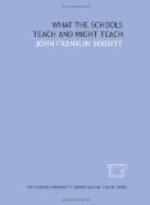“The important problem of the seventh and eighth grades is to enable the pupils to understand and deal intelligently with the most important social institutions with which arithmetical processes are associated.”
In discussing the teaching of the mathematical aspect of insurance, we find this statement: “Owing to the important place this subject holds in life, we should emphasize its informational value rather than its mathematical content.”
Under taxation and revenue: “If the general features of this subject are presented from the standpoint of civics, the pupils should have no difficulty in solving the problems as no new principle is introduced.”
Under stocks and bonds: “Pupils should be taught to know what a corporation is, its chief officers, how it is organized, what stocks and bonds are, and how dividends are declared and paid, in so far as such knowledge is needed by the general public.”
These statements indicate a recognition of the most important principle that should control in the development of all of the mathematics, elementary and secondary, beyond the preliminary training needed for accuracy and rapidity in the fundamental operations.
When this principle is carried through to its logical conclusion, it will be observed that most of these developments will not take place within the arithmetic class, but in the various other subjects. Arithmetic teaching, like the teaching of penmanship, etc., is for the purpose of giving tools that are to be used in matters that lie beyond. The full development will take place within these various other fields. For the present, it probably will be well for the schools to develop the matters both within the arithmetic classes and in the other classes. Neither being complete at present, each will tend to complete the other.
On the side of the preliminary training in the fundamental operations, the present arithmetic course of study is on the whole of a superior character. It provides for much drill, and for a great variety of drill. It emphasizes rapidity, accuracy, and the confidence that comes to pupils from checking up their results. It holds fast to fundamentals, dispensing with most of the things of little practical use. It provides easy advances from the simple to the complicated. The field of number is explored in a great variety of directions so that pupils are made to feel at home in the subject. One large defect is the lack of printed exercise materials, the use of which would result in greatly increased effectiveness. Such printed materials ought to be furnished in great abundance.
ALGEBRA
In the report of the Educational Commission of Cleveland, 1906, we find the following very significant sentences relative to the course of study for the proposed high school of commerce:




